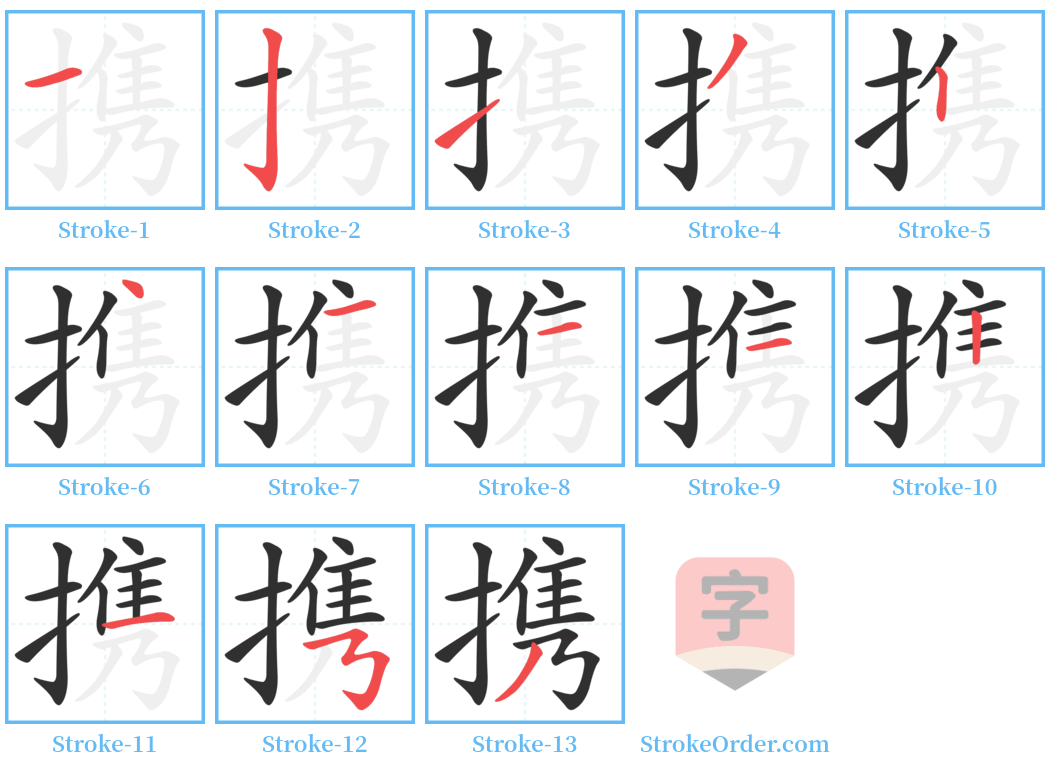携 Stroke Order
Animated Stroke Order of 携

Stroke Order Diagrams for 携

Step-by-Step Handwriting Guide for 携

Learn to Write Chinese Characters with Video Tutorials
Watch the video of writing the Chinese character "携", learn the correct stroke order (笔顺) of the character "携", and master the standard way of writing the character "携".
Free Printable Handwriting Practice with Stroke Order: 携
Printable Writing Practice Worksheet of "携" in Portrait Orientation (Tian Zi Ge)

Printable Writing Practice Worksheet of "携" in Landscape Orientation (Tian Zi Ge)

Information of 携
Pinyin
xié
Radical
扌
Strokes
13 strokes
Usage
★★★★★
Definition
to carry / to take along / to bring along / to hold (hands)
Definition of 「携」:
1. 带 (To carry)
- Example: 携手 (to hold hands)
- Example: 携带 (to bring along, to care for)
- Example: 扶老携幼 (to help the elderly and support the young)
2. 离,叛离 (To depart, to rebel)
- Example: 携离 (to depart)
- Example: 携贰 (to rebel)
携 (xié)
- Pinyin: 携
- Part of Speech: Verb
- Original Meaning: To hold (to carry in hand)
- Etymology: A phono-semantic compound; composed of "手" (hand) and "巂" (xī), often written as 攜 (xié).
1. 同本义 (Same original meaning: to lift and carry something from the ground) [En. carry in hand]
- Reference: 《说文》: 携,提也 (to carry).
- Quote: 《诗·大雅·板》: 如璋如圭,如取如携 (like jade, like a precious stone, as if taken and carried).
- Example: 携壶; 携带 (to lift; to care for); 携酒牵羊 (to carry wine and lead sheep); 携杖 (to carry a staff).
2. 拿着,持 (To hold) [En. hold]
- Reference: 清·孔尚任《桃花扇》: 闲携杖,漫出门,官槐满路叶纷纷 (idly holding a staff, leisurely walking out, the leaves of the official locust trees falling everywhere).
- Example: 携盘; 携帚 (to hold a tray; to hold a broom).
3. 牵挽; 挽扶 (To lead) [En. lead]
- Reference: 《淮南子·览冥》: 相携于道 (to walk together on the road).
- Reference: 清·林觉民《与妻书》: 吾与汝并肩携手 (I and you walk shoulder to shoulder).
- Example: 携抱 (to lead and support); 携率 (to lead); 携将 (to support); 相携于道 (to walk together on the road); 携幼扶老 (to assist the young and the old); 携扶 (to support); 携负 (to carry on one's back).
4. 带,随身一道 (To bring along) [En. bring along]
- Reference: 《公羊传·襄公二十七年》: 携其妻子 (to bring along one's wife and children).
- Reference: 《庄子·让王》: 于是夫负妇戴,携子入于海 (Thus, the husband carries his wife on his back and brings their child to the sea).
- Example: 携子同行 (to take the child along); 携女归宁 (to bring the daughter back home); 携行 (to carry on the journey); 携家眷同行 (to bring family members along); 携款潜逃 (to abscond with funds); 携械投诚 (to surrender with weapons).
5. 通“愶”。离; 背离; 离散 (To depart; to rebel) [En. discord]
- Reference: 《左传·僖公七年》: 招携以礼,怀远以德 (To invite with courtesy and hold distance with virtue).
- Reference: 《左传·僖公二十八年》: 不如私许复曹,卫以以携之 (It is better to privately promise to return to Cao).
- Reference: 《国语·周语上》: 其刑矫诬,百姓携贰 (If the punishment is enforced unjustly, the people will rebel).
- Reference: 《西湖二集》: 须要宣布皇灵,携其党羽,则王直势孤,自不能容 (We must announce the emperor's spirit; if we take our factions, it will leave the king alone without support).
- Example: 携爽 (to depart); 携弛 (to become negligent); 携泮 (to disperse); 携贰 (to harbor dual loyalties, to rebel); 携背 (to betray, to depart); 携叛 (to rebel).
to take all one's family along (idiom); encumbered by a family / tied down by family obligations
Input Method for 携
Pinyin
xie2
Wubi
rwye|rwyb
Cangjie
qogs
Zhengma
dnym
Four Corner
50027
Unicode
U+643a
Same Pronunciation Characters